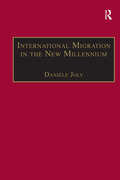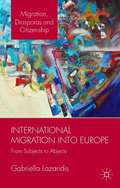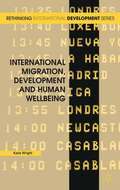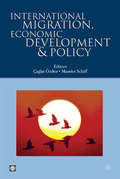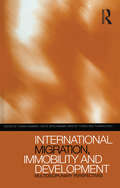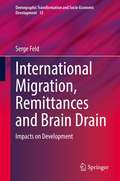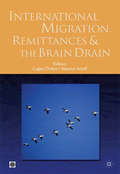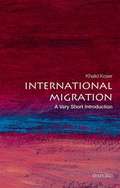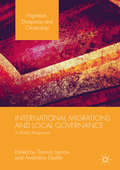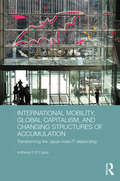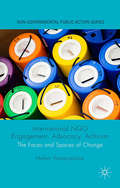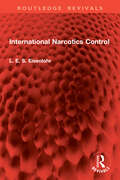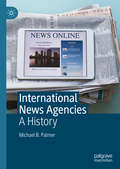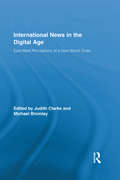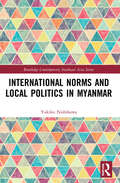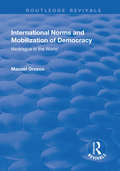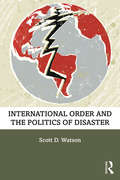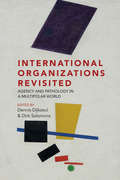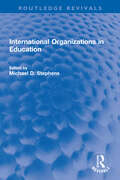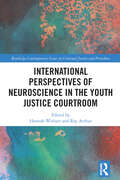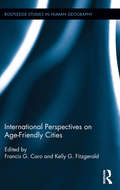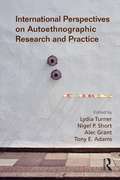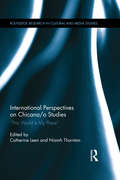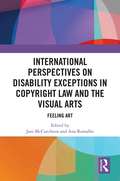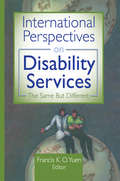- Table View
- List View
International Migration in the New Millennium: Global Movement and Settlement (Research in Migration and Ethnic Relations Series)
by Danièle JolyInternational migration is an issue of enduring interest and debate, as strong as ever in the 21st century. This in-depth, global examination proposes a balance sheet of international migration and highlights its consequences regarding migrant populations at the turn of the century. It draws together theoretical studies supported by empirical examples, and derives from quantitative as well as qualitative research. Assessing the major existing models within the theory of international migration, the contributors continue to examine a variety of key themes, including: increased flows of female migration; the meaning and relationship between identity, ethnicity and diaspora; return migration and the complex problem of reintegration. The volume also establishes a typology of refugees and examines the different domains of ethnicity and racism. A valuable volume for all those interested in migration, population settlement and transnational communities, it addresses all the major issues of international migration in the new millennium.
International Migration into Europe
by Gabriella LazaridisMigratory pressure is growing and with it the challenge to address the integration of migrants into the social fabric of the EU in a coherent and comprehensive manner. Migrants are subject to different forms and degrees of marginalization in the inclusion-exclusion continuum, which in turn leads to exposure to different forms and degrees of risk and vulnerability. The transcultural subject finds himself/herself excluded from the host society. In this respect migrants are transformed from being legal subjects as they turn into legal abjects. The process of abjectification is not linear, and differs according to one's differential inclusion and/or exclusion in the host country. Gabriella Lazaridis aims to decipher the complex web of structural, institutional and cultural contradictions which shape the inclusion-exclusion dialectic and the multifaceted grid within which the 'us' becomes the 'other' and the 'other' becomes the 'us' within the transformation of the European space intoa transnational one in the wider globalization process.
International Migration, Development and Human Wellbeing
by Katie WrightKatie Wright explores how human wellbeing is constructed and how it 'travels' across spatial boundaries. She draws on empirical research, undertaken with Peruvian migrants based in London and Madrid and their Peru-based relatives and close friends to explore how human wellbeing is constructed and how it 'travels' transnationally.
International Migration, Economic Development & Policy
by Maurice Schiff Çaglar ÖzdenInternational migration has become a central element of international relations and global integration due to its rapidly increasing economic, social, and cultural impact in both source and destination countries. This book provides new evidence on the impact of migration and remittances on several development indicators, including innovative thinking about the nexus between migration and birth rates. In addition, the book identifies the effect of host country policies on migration flows, examines the determinants of return and repeat migration, and explores the degree of success of return migrants upon return to their country of origin.
International Migration, Immobility and Development: Multidisciplinary Perspectives
by Tomas HammarThe study of international migration and ethnic relations is rapidly expanding in the social sciences, in the humanities, and in law and medicine at universities around the world. Theories and methods are borrowed from many disciplines, but with little cross-fertilization, thereby leaving many core issues out. This authoritative book fills a gap by providing an expertly integrated overview of international migration from a wide range of disciplinary perspectives. Throughout the book, South to North migration is used as the main example.The authors, leading experts in their fields, ask provocative new questions such as the counterfactual, `Why do people not migrate?' and address old questions in fresh ways in a language accessible for students in a range of disciplines. Does migration from less developed countries stimulate or obstruct development? Does development reduce or increase the flows of migration? What are the dynamics of a migration process? Geography, economics, political science, social anthropology and sociology all inform this book, which is certain to become an established text in migration studies.
International Migration, Remittances and Brain Drain: Impacts on Development (Demographic Transformation and Socio-Economic Development #13)
by Serge FeldThis book provides an analysis of theoretical and empirical researches on the effects of remittances and brain drain on the development of less developed countries (LDCs). It analyzes the most recent global, regional and national data as well as the arguments for and against the emigration of highly skilled personnel and remittances, thereby highlighting policies aimed at optimizing the link between migration and development. The book examines in depth the arguments against "brain drain", namely the loss of skilled labor, wasted public investment in higher education, and reduced tax revenues. It also presents the arguments in favor, emphasizing on the transfer of scientific knowledge, the incentive effect of increased education spending, and participation in international networks. It addresses the central issue of emigration of medical personnel from developing countries and its consequences on the population.The book focuses on the effects of remittances on poverty and inequalities. They improve health conditions, raise education levels and empower women. Positive effects include the stabilizing function of remittances and the improvement of external accounts. Other effects are subject to conflicting assessments such as the reduction of labor supply and the "Dutch disease". The focus is on institutions who integrate economic, social and political incentives in order to establish remittances at the heart of development policies.The book provides a reference for students and research centers devoted to development economics, centers for international migration studies, and research units focusing on population, migration, and development.
International Migration, Remittances, and the Brain Drain
by Maurice Schiff Çaglar ÖzdenInternational migration, the movement of people across international boundaries, has enormous economic, social and cultural implications in both origin and destination countries. Using original research, this title examines the determinants of migration, the impact of remittances and migration on poverty, welfare, and investment decisions, and the consequences of brain drain, brain gain, and brain waste.
International Migration: A Very Short Introduction
by Khalid KoserInternational migration is an issue of intense public and political concern. How closely linked are migrants with terrorist organizations? What factors lie behind the dramatic increase in the number of woman migrating? This Very Short Introduction looks at the global phenomenon of human migration--both legal and illegal--revealing how migration actually presents opportunities that must be taken advantage of in light of the current economic climate. The author debunks myths such as the claim that migrants take jobs away from local workers, or that they take advantage of health care systems. He reveals why society as we now know it could not function without them. Using interviews with migrants from around the world, the author presents the human side of topics such as asylum and refugees, human trafficking, migrant smuggling, development, and the international labor force. His goal throughout is to allow readers to see beyond the negative spin usually given the subject by the media and politicians, and come to their own conclusions on the current international migration situation. It is a valuable reference for students of economics, politics, geography, or sociology, and for anyone interested in taking a deeper look at media coverage of immigration and its effects.
International Migrations and Local Governance
by Thomas Lacroix Amandine DesilleThis volume provides a comprehensive overview of the role of local governments around the world in the management of the migration, integration and development nexus. Drawing on case studies from the Global North and South, this comparative work fills a lacuna in the existing literature which has focused largely on migration as addressed by European and North American cities. Further, it widens the current debate by confronting northern experiences with attitudes and strategies observed in sending countries; clearly demonstrating that international mobility has become a global issue for cities at both end of the migration spectrum. This innovative work will provide a valuable resource for students and scholars working in the social sciences, public policy and development; in addition to practitioners and policymakers.
International Mobility, Global Capitalism, and Changing Structures of Accumulation: Transforming the Japan-India IT Relationship (Routledge Advances in International Political Economy)
by Anthony P. D'CostaInternational mobility is not a new concept as people have moved throughout history, voluntarily and forcibly, for personal, familial, economic, political, and professional reasons. Yet, the mobility of technical talent in the global economy is relatively new, largely voluntary, structurally determined by market forces, and influenced by immigration policies. With over a decade's worth of extensive research in India, Japan, Finland, and Singapore, this book provides an alternative understanding of how capitalism functions at the global level by specifically analyzing the international movement of technical professionals between India and Japan. There are three factors that inform this study: the services transition away from manufacturing, the movement of technical professionals in the world economy, and the demographic crisis facing Japan. The dynamics of changing capitalism are examined by theorizing the emergence of the services sector in the USA and Japan, analyzing the pronounced social inequality in India that is the basis for the global supply of highly skilled technical professionals, and providing considerable empirical data on the flows of professionals to these two countries to indicate Japan's institutional inflexibility in accommodating foreign talent. The author anticipates that Japanese industry will shed some of its institutional rigidity due to the pressures of competition and the scarcity of technical professionals. Providing a wealth of information on the topic of international mobility, this book is an essential addition for scholars and students in the field of International Development, Business Studies, Asian Studies, Migration Studies, and Political Economy.
International NGO Engagement, Advocacy, Activism: The Faces and Spaces of Change (Non-Governmental Public Action)
by Helen YanacopulosThe world of international non-governmental organisations (INGOs) has dramatically changed during the last two decades. The author critically analyses the engagement of INGOs within the contemporary international development landscape, enabling readers to further understand INGOs involvement in the politics of social change.
International Narcotics Control (Routledge Revivals)
by L. E. EisenlohrFirst published in 1934, International Narcotics Control is concerned with dangerous drugs solely as a subject of international administration. The ultimate questions that this study seeks to answer bear upon the form and function of the international organisms which have been set up to deal with drug traffic. What relation shall the function of a body bear to the method of its appointment, to its composition, and to source of its responsibility? What type of organism will secure the best response from national administrations? What should be the method of contact between national and international bodies? The answers to questions such as these can be found in this study.Divided into two parts, the book discusses important themes like the establishment and the work of the Opium Advisory Committee, the origin and functioning of the Permanent Central Opium Board; and the control of raw opium production in India, former Yugoslavia, Turkey, and Persia. This is an important historical reference work for scholars and students of criminology.
International News Agencies: A History
by Michael B. PalmerInternational news-agencies, such as Reuters, the Associated Press and Agence France-Presse, have long been ‘unsung heroes’ of the media sphere. From the mid-nineteenth century, in Britain, the US, France and, to a lesser extent, Germany, a small number of agencies have fed their respective countries with international news reports. They informed governments, businesses, media and, indirectly, the general public. They helped define ‘news’. Drawing on years of archival research and first-hand experience of major news agencies, this book provides a comprehensive history of the leading news agencies based in the UK, France and the USA, from the early 1800s to the present day. It retraces their relations with one another, with competitors and clients, and the types of news, information and data they collected, edited and transmitted, via a variety of means, from carrier-pigeons to artificial intelligence. It examines the sometimes colourful biographies of agency newsmen, and the rise and fall of news agencies as markets and methods shifted, concluding by looking to the future of the organisations.
International News in the Digital Age: East-West Perceptions of A New World Order (Routledge Research in Journalism)
by Judith Clarke Michael BromleyThe new research presented in this volume suggests that general perceptions (cultural, psychological, geographical), allied to the customs and values of journalism, and underpinned by the uses of technology, significantly shape international news. This gives rise to a blend of the old and the new; traditions of cultural centredness and innovative practices; anchorages of place and the rootlessness of globalization. Technology per se has not swept all before it. On the other hand, its uses have altered the means and methods of international news sourcing, construction and dissemination. Consequently, the uptake of technology has contributed to fundamental changes in style and form, and has greatly facilitated cross-cultural exchanges. The category ‘international news’ is now more of a hybrid, as recognized by the BBC and others. The chapters in this book demonstrate that this hybridity is unevenly distributed across geo-political domains, and often across time. Nevertheless, as the contributors to this volume show, the concept of ‘international news’ relies on tightly interwoven elements of orthodox journalism, social media, civic expression and public assembly.
International Norms and Local Politics in Myanmar (Routledge Contemporary Southeast Asia Series)
by Yukiko NishikawaNishikawa explores how international norms have been adopted in the local context in Myanmar to project a certain international image, while in fact the authorities are exploiting these norms to protect their own interests. In the liberal international world order promoted since the end of the Cold War, democracy, rule of law and human rights have become key components in state and peace-building around the world. Many donor governments and international organisations have promoted them in their aid and assistance. However, the promotion of these international norms is based on a flawed understanding of sovereignty and the world. For this reason, the enforcement of these international norms in Myanmar not only fails to protect vulnerable people but also, in some instances, exacerbates the situation, thereby generating critical insecurity to the most vulnerable people. A vital resource for scholars of Myanmar’s politics, as well as a valuable case study for International Relations scholars more broadly.
International Norms and Mobilization for Democracy: Nicaragua in the World (Routledge Revivals)
by Manuel OrozcoThis title was first published in 2002: This volume demonstrates that international action for democracy does not solely rest on American democracy promotion strategies, but that it actually depends on a variety of global actors and interactions. It is suitable for policy experts, non-governmental organizations, international aid agencies and courses on international relations theory, comparative politics, and Latin American politics. The book: introduces a theoretical framework about the effect of international norms on democracy promotion; connects the role of international institutions and norms with advocacy movements in shaping the mobilization to promote democracy; analyses the relationship between the international dimension of democracy promotion and democratization; explains the effect of international democracy promotion in the political transition of Nicaragua from 1979 to 2001; and brings into analysis the various modalities of democracy promotion and their effects.
International Order and the Politics of Disaster
by Scott D. WatsonIn this indispensable and comprehensive text, Scott D. Watson critically examines the current understanding of international order that underpins international disaster management and disaster diplomacy. Based on empirical analysis of the three international disaster management regimes - disaster relief, disaster risk reduction, and disaster migration - and case studies of disaster diplomacy in the United States, Egypt and China, Watson argues that international disaster management and disaster diplomacy are not simply efforts to reduce the impact of disasters or to manage bilateral relations but to reinforce key beliefs about the larger international order. Challenging the conventional understandings of disasters as natural, as exogenous shocks, or as unintended and accidental outcomes of the current order, this text shows how the ideological foundations of the current heterogenous international order produce recurrent disasters. International Order and the Politics of Disaster is a vital source for undergraduate or graduate students interested in international responses to disasters and complex humanitarian emergencies, forced migration and displacement, as well as climate change and development.
International Organizations Revisited: Agency and Pathology in a Multipolar World
by Dennis Dijkzeul and Dirk SalomonsDespite the sustained scholarly attention that the United Nations and international NGOs have received in the twenty-first century, they still remain under-researched from a management studies perspective. This volume brings together rich analyses of these organizations’ functioning, arguing that they are best understood as intermediaries between international decision-making and funding bodies in the developed world and initiatives that take place on the ground, primarily in the Global South. Based on current management research, this follow-up to Rethinking International Organizations (Berghahn, 2002) provides a wealth of both empirical and theoretical insights, along with practical recommendations how these organizations can function more effectively.
International Organizations in Education (Routledge Revivals)
by Michael D. StephensFirst published in 1988, International Organizations in Education is a collection of essays written to explore the various roles of international organizations in the field of adult education. The book highlights two distinct categories that emerged: organizations with a world-wide commitment, such as Unesco, ad those with a more regional basis, such as the African Association for Literacy and Adult Education. Each contributor examines the history and contemporary characteristics of the organization before going on to consider possible future directions. The achievements and role of such organizations are considered, and each author offers a depth of personal experience. International Organizations in Education offers a varied and wide-ranging view of the history of international organizations in the field of education and the role of those organizations at the time of original publication.
International Perspectives of Neuroscience in the Youth Justice Courtroom (Routledge Contemporary Issues in Criminal Justice and Procedure)
by Hannah Wishart Ray ArthurThis collection presents international viewpoints on interdisciplinary problems that fall under the new and emerging field of neurojustice. The chapters critically explore a wide range of legal problems in youth justice for children and young persons through a neuroscientific lens. This comparative view is informed by analyses from academics and legal practitioners based in England and Wales, Ireland, the United States, and New Zealand. The work brings together a range of perspectives to discuss the use and relevance of neuroscience in the youth justice courtroom and how neuroscience is currently benefiting and impacting children and young persons in international youth justice trials. The book makes a valuable contribution to the existing literature in this field by offering a thorough examination of the intersection between these disciplines for children and young individuals at different stages of the trial process, including unfitness to plead, sentencing, and mens rea. It will appeal to students, academics and practitioners worldwide working in the areas of criminal law, neurolaw, neuroethics, juvenile law, and comparative law.
International Perspectives on Age-Friendly Cities (Routledge Studies in Human Geography)
by Kelly G. Fitzgerald Francis G. CaroThis book brings together recent scholarly work concerned with efforts around the world to transform cities so that they are more age-friendly. Common to all of the initiatives is recognition of the importance of the community environment for the well-being of the rapidly growing numbers of older people. The collection includes chapters that examine the circumstances in which communities currently undertake significant age-friendly initiatives, public-private collaboration in age-friendly initiatives, collaboration across institutional sectors in age-friendly initiatives, policies that facilitate age-friendly developments, and the bases upon which age-friendly initiatives should be evaluated. It will be of interest to scholars in various fields including urban planning, gerontology, transportation planning, environmental design, and adult education.
International Perspectives on Autoethnographic Research and Practice
by Alec Grant Lydia Turner Tony E. Adams Nigel P. ShortInternational Perspectives on Autoethnographic Research and Practice is the first volume of international scholarship on autoethnography. This culturally and academically diverse collection combines perspectives on contemporary autoethnographic thinking from scholars working within a variety of disciplines, contexts, and formats. The first section provides an introduction and demonstration of the different types and uses of autoethnography, the second explores the potential issues and questions associated with its practice, and the third offers perspectives on evaluation and assessment. Concluding with a reflective discussion between the editors, this is the premier resource for researchers and students interested in autoethnography, life writing, and qualitative research.
International Perspectives on Chicana/o Studies: This World is My Place (Routledge Research in Cultural and Media Studies)
by Niamh Thornton Catherine LeenThis volume examines how the field of Chicana/o studies has developed to become an area of interest to scholars far beyond the United States and Spain. For this reason, the volume includes contributions by a range of international scholars and takes the concept of place as a unifying paradigm. As a way of overcoming borders that are both physical and metaphorical, it seeks to reflect the diversity and range of current scholarship in Chicana/o studies while simultaneously highlighting the diverse and constantly evolving nature of Chicana/o identities and cultures. Various critical and theoretical approaches are evident, from eco-criticism and autoethnography in the first section, to the role of fiction and visual art in exposing injustice in section two, to the discussion of transnational and transcultural exchange with reference to issues as diverse as the teaching of Chicana/o studies in Russia and the relevance of Anzaldúa’s writings to post 9/11 U.S. society.
International Perspectives on Disability Exceptions in Copyright Law and the Visual Arts: Feeling Art
by Jani McCutcheon and Ana RamalhoThis book provides an overview of disability exceptions to copyright infringement and the international and human rights legal framework for disability rights and exceptions. The focus is on those exceptions as they apply to visual art, while the book presents a comprehensive study of copyright’s disability exceptions per se and the international and human rights law framework in which they are situated. 3D printing now allows people with a visual impairment to experience 3D reproductions of paintings, drawings and photographs through touch. At the same time, the uncertain application of existing disability exceptions to these reproductions may generate concerns about legal risk, hampering sensory art projects and reducing inclusivity and equity in cultural engagement by people with a visual impairment. The work adopts an interdisciplinary approach, with contributions from diverse stakeholders, including persons with disabilities, cultural institutions and the 3D printing industry. The book sketches the scene relating to sensory art projects. Experts in intellectual property, human rights, disability and art law then critically analyse the current legal landscape relating to disability access to works of visual art at both international and regional levels, as well as across a broad representative sample of national jurisdictions, and identify where legal reform is required. This comparative analysis of the laws aims to better inform stakeholders of the applicable legal landscape, the legal risks and opportunities associated with sensory art and the opportunities for reform and best practice guidelines, with the overarching goal of facilitating international harmonisation of the law and enhanced inclusivity.
International Perspectives on Disability Services: The Same But Different
by Francis K.O. YuenLearn how to include multiculturalism in disability-related social work! International Perspectives on Disability Services: The Same but Different presents different cultural and societal contexts on services for people with disabilities. This book covers a range of topics on disabilities related to physical status, emotional conditions, and community settings. This useful introductory reference will help you develop culturally sensitive disability services both locally and overseas, and it will promote better understanding of people with disabilities. This book is a unique examination of services for people with disabilities as they exist in several countries. Until recently, cultural context was used to describe race or ethnicity, but this innovative text recognizes people with disabilities as a worldwide community that is advocating for equality and respect. International Perspectives on Disability Services focuses on the need for human and social services that endorse capability and empowerment-promoting the person rather than the disability. In International Perspectives on Disability Services, you&’ll learn about: using the term "culture" to describe the community of people with disabilities-how cultural sensitivity and competency can be applied to the disability culture the dynamics of a transcultural relationship between psychotherapist and deaf or hard-of-hearing individuals the recent development in aphasia treatment-Life Participation Approach to Aphasia (LPAA)-and the international perspective of communication therapy a comparison of attitudes among social work students in the United States and Japan toward people with disabilities-people with disabilities are not yet integrated into Japanese society, but both groups showed room for needed improvement a comparison of disability-related services and experiences in the United States and in Germany-child-raising leave, child-raising money, and Kindergeld (child money) helps support parents financially for the first few years, but the United States has more options for integrated schooling later in life Hong Kong&’s 25-year-old objective to encourage community integration and normalization for people with disabilities to live in the community the primary support network of family, community leaders, and shaman for people with disabilities among Hmong Americans in Northern California The informative reports, research findings, case studies, and international comparisons offer new directions for human service professionals and students to help them better meet the social, psychological, and cultural needs of people with disabilities. International Perspectives on Disability Services provides clear-cut evidence that disability-oriented social workers need to improve their perspectives as the disability culture gains momentum as a social entity. This book is a must-read for anyone who works or provides disability-related services, as well as for people with disabilities who need more information on other countries&’ services.
